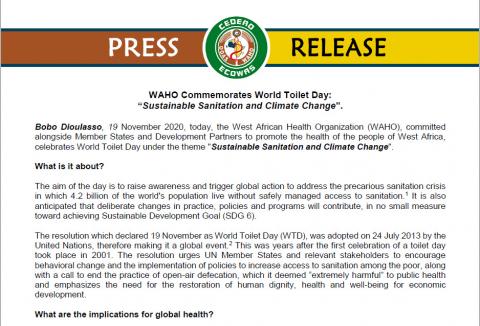
Bobo Dioulasso, 19 November 2020, today, the West African Health Organization (WAHO), committed alongside Member States and Development Partners to promote the health of the people of West Africa, celebrates World Toilet Day under the theme "Sustainable Sanitation and Climate Change".
What is it about?
The aim of the day is to raise awareness and trigger global action to address the precarious sanitation crisis in which 4.2 billion of the world's population live without safely managed access to sanitation.[1] It is also anticipated that deliberate changes in practice, policies and programs will contribute, in no small measure toward achieving Sustainable Development Goal (SDG 6).
The resolution which declared 19 November as World Toilet Day (WTD), was adopted on 24 July 2013 by the United Nations, therefore making it a global event.[2] This was years after the first celebration of a toilet day took place in 2001. The resolution urges UN Member States and relevant stakeholders to encourage behavioral change and the implementation of policies to increase access to sanitation among the poor, along with a call to end the practice of open-air defecation, which it deemed “extremely harmful” to public health and emphasizes the need for the restoration of human dignity, health and well-being for economic development.
What are the implications for global health?
It is reported that over 673 million people currently practice open defecation, one in three people lack access to safe drinking water and two out of five people with no basic handwashing facilities such as soap and water. This shows the implications of the crisis to other SDGs – particularly the SDG goal on health and well-being – Goal 3 (with a focus on target 3.3. – “to end the epidemics of AIDS, tuberculosis, malaria and neglected tropical diseases and combat hepatitis, water-borne diseases and other communicable diseases” and Target 3.9: “to substantially reduce the number of deaths and illnesses from hazardous chemicals and air, water and soil pollution and contamination”.)[3]
The goal additionally demonstrates the links between the sanitation crisis and the resurgence of infections and epidemics and the need to promote the establishment of sustainable, multisector action for improved water, sanitation and hygiene systems. The sustainable sanitation system includes several factors based on a reliable hygienic sewerage system, a drinking water distribution system and a safe, accessible and dignified environment. These, however, are threatened by climate change and what inspired the theme of this year's global celebration of 2020: Sustainable sanitation and climate change”.
West Africa is not escaping the crisis as it is regularly hit by epidemics of all kinds including cholera, typhoid fever, Ebola, Lassa fever and more recently COVID-19. Furthermore, the COVID-19 pandemic and other epidemics shows how fundamental accessibility and availability of Water Sanitation and Hygiene (WaSH) services are for preventing and controlling the spread of diseases. According to the World Health Organization, handwashing as one of the most effective to reducing the spread of pathogens and prevent infections[4], including the COVID-19 virus and yet billions of people still lack safe water sanitation.
WAHO’s actions and recommendations to Member States
Aware of this fact, the West African Health Organization (WAHO), will be conducting a situational analysis across the 15 countries. The findings should make it possible to develop, a regional Water, Hygiene and Sanitation (WaSH) strategy within a framework of health promotion and behavioral change at the individual, organizational and at community levels. It will provide a roadmap for member countries as they develop their national strategies in this area and strengthen capacities to establish sustainable sanitation systems capable of coping with and resisting the climatic disasters experienced in the region. More specifically, it will enable member countries to protect the health of their populations by instilling in them the practical and systematic use of latrines/toilets and very importantly, the systematic washing of hands after using the toilets.
WAHO is also engaged in promoting the "One Health" approach which combines human health, animal health and environmental health in a perspective of integrating health in all development policies while strengthening multi-sectoral collaboration. To this end, a regional strategic plan has been drawn up for validation by the competent authorities of the ministerial departments.
Despite the progress made toward achieving SDG 6, WAHO encourages all ECOWAS Member States to:
- Develop or update national strategies aimed at improving basic services and access to drinking water and sanitation;
- Promote and implement a multisector approach that takes into consideration the various interlinked SDGs contributing to improved health and well-being of our population
- Adapt a "One Health" approach;
- Continue to support affected, at-risk, low-capacity and fragile countries to secure WASH services and infection prevention control in health facilities.
- Ensure that basic facilities for latrines, handwashing with soap and water (crucial at this point in time to address COVID-19), are available throughout the country.
In partnership with key development actors, WAHO and its designated departments, alongside, ECOWAS and the Regional Center for Surveillance and Disease Control (RCSDC), remain committed to delivering on her mandate to safeguard the health and well-being of the people of its region through its relentless efforts in promoting health for sustainable sanitation and climate change.
- END -
[1] https://www.un.org/en/observances/toilet-day
[2] http://sdg.iisd.org/events/world-toilet-day-2020/
[3] https://unstats.un.org/sdgs/metadata/
[4] https://www.who.int/news-room/events/detail/2020/05/05/default-calendar/hand-hygiene-day
